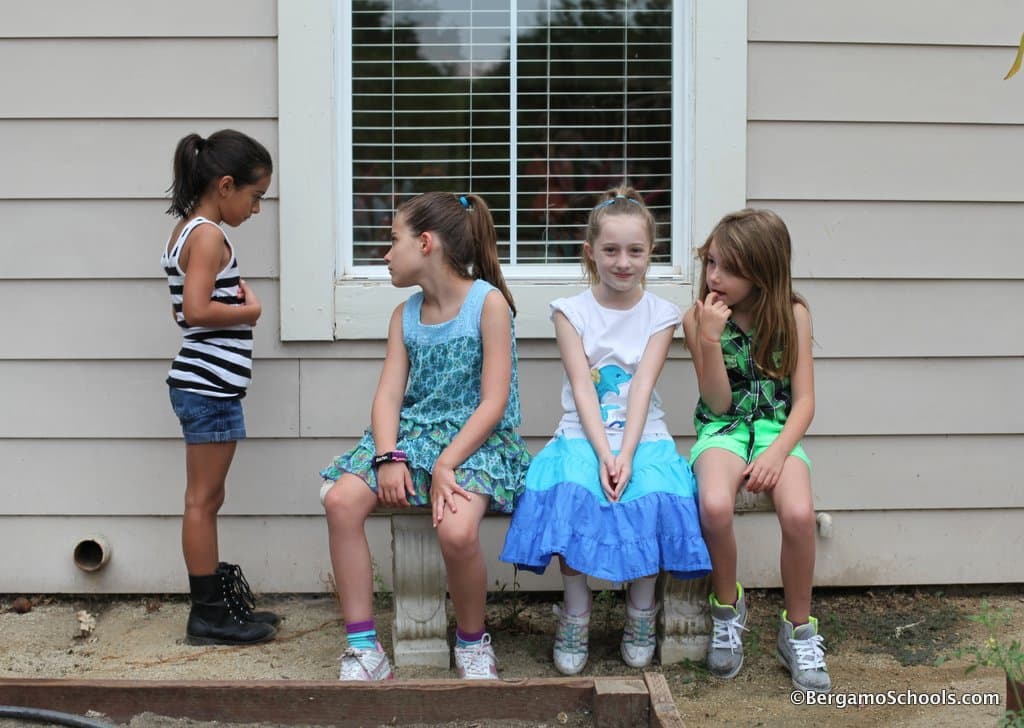by Patty Shade
“Ben is being mean to me!!”
“I don’t like Allie. She’s SO mean!”
Surprisingly, complaints like this are common in my Lower Elementary Montessori classroom. And, I’m guessing that, at one time or another, you have heard something similar from your own child.
It’s heartbreaking to see our children upset. And, while it’s important that we listen to our children, take their concerns seriously and be the best advocate for them that we can, it is also important to take their development into consideration when deciding what action to take.
Often, when we ask our child what happened, we may not get much of an explanation. We might get, “Well, Katie is just so mean!” Your child might add that he or she was pushed or yelled at – but often you’ll only hear that a certain someone is “ALWAYS mean to me!”
But, what does “mean” mean to an elementary age child? Typically, it means “I interacted with someone and it made me feel bad.” This is often light-years away from abuse, yet can feel just as upsetting to your child — especially as she or he is learning to navigate the world of social interaction.
But, what does “mean” mean to an elementary age child? Typically, it means “I interacted with someone and it made me feel bad.” This is often light-years away from abuse, yet can feel just as upsetting to your child — especially as she or he is learning to navigate the world of social interaction.
Here are just a few things I’ve heard in the classroom illustrating situations that the overpowered child might label as meanness:
“If you don’t work with me, then I’ll never be your friend again.”
“You can work with me, but you have to sit over there and can only use the blue pencil.”
“I keep asking Ben a question and he keeps ignoring me!”
“They are being mean because they don’t want to play the game I want to play.”
“We wanted them to chase us, but now we don’t want them to and they won’t stop.”
Although these interactions may seem mild to an adult, to a six year old, they can be devastating. What is the best strategy, then, to help your child through this crucial phase of social development? When you get a complaint about meanness, don’t be alarmed. Chances are, the event was less earth-shattering than it sounds. It may also have already been worked through during the school day and your child simply wants to process it with you.
Social interaction is a regular feature of the Montessori classroom, so these social encounters are everyday occurrences. To us, they are not inconveniences, but natural and helpful opportunities to learn about the use (and abuse) of power and desire. The children learn to not just navigate these situations, but to analyze and diffuse them. This takes time and patience on the part of the teacher, but we see it as a life skill as important to your child’s success as math or reading.

Here are a few suggestions to help your child through these new life lessons:
1. Know that you are your child’s “soft place to land”. Issues that came up during the day may resurface – especially at bedtime. Listen carefully and reassure them that they can handle future difficulties that come their way.
2. Listen to your child without showing judgement or fear. Your child will look to you for cues about the importance of an incident. An emotional reaction may interfere with their ability to work it through themselves or cause them to second-guess their resolution.
3. Set up a time to observe in your child’s classroom and/or recess time. This will give you a more complete picture of the dynamics of the class and your child’s place in it.
4. Remind your child to talk to his or her teacher . Although this sounds obvious, there have been times that I have heard from parents about problems that were never brought to my attention — either by my observation or by the student.
5. Remember that you are only hearing your child’s perspective of the conflict and the details will always be colored by their personal desires, wishes and point of view.
6. Talk with the teacher. Details about the conflict from his or her perspective and information about how it was addressed can help you talk through the problem with your child.
7. Teach your child that conflict is part of life. Our wishes and desires may not be the same as others. The concept of “not getting what you want” can be VERY difficult for children at this age, but is crucial to their success in the future.
8. If a problem continues, continue to communicate and work with the teacher to find a solution. Remember that it can take time to solve complex social issues with children.
The years of practice that your child will get through a Montessori education — where learning to handle social interaction is part of the program — along with your loving support, will reap rewards in your child’s future.